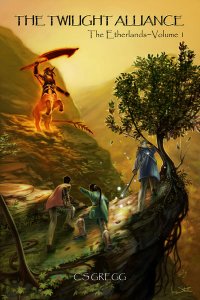The Twilight Alliance
by CS Gregg

Reviewed by Coral
The Shanawar have long been slaves to the human race, toiling as miners in underground caves, as they cannot live in the sun. But all that is about to end (except for the living in the sun part), as their leader, Groeken Blyte has united his people with the intention of taking their freedom from the humans. Joining the Shanawar in this Twilight Alliance are the Grox, who are also intent on destroying humankind. Worse, Groeken Blyte has in his possession the Aestus mask, a cursed object, possessed by a demon that is slowly taking control of him.
Simon Tabiri is a simple thief and sorcerer - though secretly, because the church is against sorcery - going about his life. One day, as he is waiting for his next mission from the Thieves' Guild, he rescues an old man being beaten by church goons who believe the man to be a sorcerer. Thing is, they were right! The old man, Mikallus, was a friend to Simon's now dead uncle Erasto. He needs Simon's help to find Erasto's journal, which he believes must contain the keys to defeating Groeken Blyte, the Shanawar and the Twilight Alliance!
This is a truly terrible book.
The writing is on a grade school level; it's clunky and repetitive. Just as an example: "For a moment, he thought beyond his problems and wondered if he would ever get the chance to do what Erasto had done. Simon wondered if he would ever get the chance to do what his uncle did." There's also not a lot of subtlety to it, with the author pretty much beating it over your head that this is a story about good versus evil.
There's this part when Simon first learns that Mikallus is a sorcerer and he's freaking out because the penalty for harboring a sorcerer is death. Um, Simon, you're a sorcerer too! Be more worried that someone's going to find that out!
A really minor issue is when one of the characters uses the saying "That's like the pot calling the kettle black." In a fantastical setting, is it too much to ask to just make up sayings more in line/appropriate with the world of your characters?
I'm also trying to figure out why the bad guy's name changed randomly for two lines around page 54.
And, seriously, when Simon is having a flashback of a time when his uncle was alive, there really shouldn't be any inner thoughts or emotions from the uncle's point of view. They're Simon's memories!
This shouldn't wreck too much of the plot, because it comes from the first 60 pages - where I gave up completely on the book - but I was also trying to figure out how come the city guard's didn't try to get to the creatures attacking the old man but instead made straight for Simon. Hello, creatures coming from the sky! Plus, why weren't the villagers more loyal to Simon, considering that they loved his uncle so much?
Moving on to Simon's uncle, the whole thing about his journal being safe-guarded in his coffin was a little convenient. I mean, he had no one in town he trusted to put the journal in the coffin after his death, so it was lucky that he used it as a storage device during his lifetime. And lucky that he was so beloved of the people that no one stole the book from his coffin as the put the body inside. Although, come to think of it, if the coffin was spelled so that only Simon could open it, to protect the journal, how did they get the uncle's body inside the coffin?
The point when I gave up was when Simon was meeting with two contacts from the Thieves' Guild. The whole meeting scene between them, with the male contact having in his possession two "forbidden" weapons - guns - claiming to be an expert at using them and, of course, accidentally firing one as he was holstering it, felt like a scene from a crappy sitcom. And would someone really assume that someone was mute from a few hand-signals used between siblings? Especially considering they're thieves, who should have hand signals developed for all the places that they couldn't talk while robbing. Of course, their idea of a "stealth" robbery was to enlist in the army, thereby leaving a paper trail, so I guess they just weren't that smart.
Lastly, the whole imagery of the story really made me uncomfortable in much the same way that I was uncomfortable with David B. Coe's Rules of Ascension. The Shanawar were enslaved by the humans, yet when they wanted to rise up to fight for their freedom they were the bad guys on the side of evil. Okay, so they were getting help from demons and such, but still, it's an odd choice for a story's message.
Grade: F